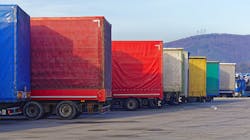Nine ways new trailer tracking solutions benefit a fleet
Telematics on trailers isn’t new. What is less known, however, is how the new generation of trailer telematics is changing the landscape of trailer management by improving safety, utilization, and driver satisfaction.
“Solutions go way beyond location tracking to provide near real-time data on health issues such as tire pressure, ABS status, lights, and more,” said Casey Ellis, president of EROAD North America, a provider of fleet management solutions and tracking systems. “Also, load volume is vital to ensuring safety, reducing costs, and increasing performance overall.”
Ellis said that a newer, more advanced trailer telematics solution can benefit a fleet in nine important ways.
- Operational team efficiency in the yard. Locating trailers on a map makes everyone in the operation more efficient. “We cannot stress enough the importance of automating yard check reporting which helps your team easily find the right trailer in the yard,” Ellis added.
- Maximize load volumes. Let your dispatchers get a view of load volume on each trailer so you can maximize revenue.
- Asset utilization. Don’t miss opportunities due to detention and uninformed capacity planning. “Take a data-driven approach to manage the busy season and rapidly reposition under-utilized trailers in other areas where things are tight,” Ellis said.
- Improve safety. “More than 70% of all FMCSA (Federal Motor Carrier Safety Administration) violations are from service and maintenance problems, many of which can be addressed by proactive knowledge of service requirements on trailers,” Ellis pointed out. “Advanced solutions can let you see inoperative lights, low tire pressure, and ABS problems remotely so you service proactively and keep your drivers and loads safe and in service.”
- Better service for customers. The importance of data on load position, delivery status, and proof of delivery is crucial to everyone in shipping and logistics. Tracking trailers helps give shippers, customers, and brokers the data they need. “With the level of affordability for trailer tracking solutions, small fleets are now able to provide the same type of real-time data as the largest fleets,” Ellis said.
- Reporting on detention time. The better data you have on detention, the more ability you have to negotiate with your key customers and shippers.
- Make drivers more productive. Having a driver hook up to a trailer with bad lights, tires, or other maintenance problems wastes time and money. “Make sure your trailers are ready for the road before they get loaded,” Ellis said.
- Prevent shrinkage and pilfering. Cargo theft is on the rise, amounting to as much as $35 billion in losses each year, according to the National Insurance Crime Bureau. “Trailer tracking coupled with compatible door and cargo sensors can alert fleet managers to a trailer door being opened when it shouldn’t be,” Ellis said. “The inclusion of GPS tracking can also aid in the recovery of lost or stolen trailers.”
- Risk, revenue, and profitability. Operating efficiency, asset utilization, and safety all impact the number of loads and tonnage a fleet can haul. Addressing service issues like low tire pressure has a big impact on fuel costs and tire wear. “Backing up on preventive maintenance can impact your CSA score and can put you at higher risk for accidents,” Ellis added.
About the Author

Gregg Wartgow
Gregg Wartgow is a freelancer who Fleet Maintenance has relied upon for many years, writing about virtually any trucking topic. He lives in Brodhead, Wisconsin.
